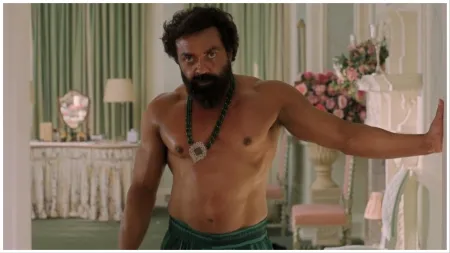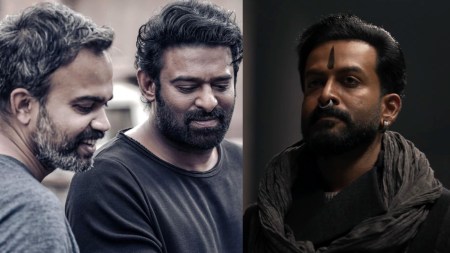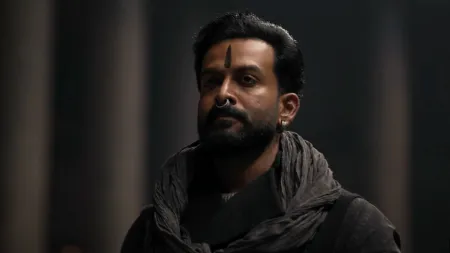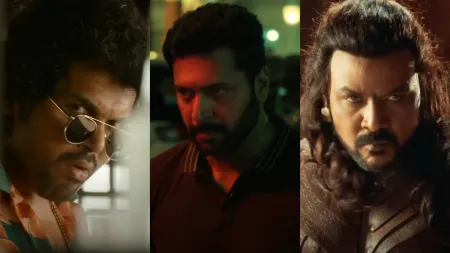“The way you perceive freedom might not be the same as how I do. Sometimes, we might have to weed out certain obstacles in our path. Isn’t that what freedom is?” observes CK Raghavan (Mammootty) in Venu’s Munnariyippu (2014), before finally uprooting the one “annoying” obstacle in his path and returning to prison, where he truly experiences freedom. The situation is somewhat the same for Brooks Hatlen (James Whitmore) in Frank Darabont’s The Shawshank Redemption (1994). It is in prison that Brooks actually feels a sense of belonging after spending 50 years behind bars. Hence, the “imprisonment” in the outside world is horrifying for both.
On the other hand, for Geetha (Beena R Chandran) in Fazil Razak’s Thadavu (The Sentence), a myriad of things, including peace, happiness and money to treat a fatal health condition, are unattainable in the real world. Consequently, for all of them, life in the outside world is an unjust sentence they have been burdened with and thus they realise that prisons are where they can breathe with ease.

With two failed marriages and several dysfunctional (platonic) relationships in life, Geetha is a character we can easily spot in our environments. We must have usually dismissed their existence, foul-mouthed them without even caring to understand what they have been through or are facing now, or even cautioned our kids against interacting with them.
In a society that still views divorce as a taboo that disrupts the perceived “sanctity” of family bonds, it’s hard to fathom the scrutiny faced by Geetha who is on the brink of her second divorce. Yet, there is something inherently likeable about Geetha. Perhaps it’s her unapologetic expression of a facet we hesitate to acknowledge within ourselves. Maybe it’s her relatable display of being done or the realisation that, like her, we too might be misunderstood and, hence, mistreated often.
However, even amidst all this, Thadavu, which bagged the coveted Audience Poll Award and helped filmmaker Fazil secure the Rajata Chakoram for Best Debut Director at the recently held 28th edition of the International Film Festival of Kerala (IFFK), doesn’t totally sympathise with Geetha, nor does it judge her. She is a person with flaws who has made unfortunate life decisions and is now grappling with the consequences.
Though her first marriage ended, her first husband appears not averse to her. However, her soon-to-be ex-husband harbours strong animosity, insisting on limiting her interactions with their daughter beyond court-mandated allowances. Moreover, we also glimpse his character when he casually tells their counsellor that she tried to “kill her daughter from her first marriage due to postpartum depression,” placing minimal emphasis on the latter part — an issue that warrants careful consideration.
But, her former husband still holds a special place for Geetha in his heart and doesn’t completely denounce her, as if he, at least later, understood what she was and had been going through.
Geetha’s other side is also evident in the love she holds for her younger daughter. Despite her second husband’s rebuke on several occasions, Geetha makes extra efforts to connect with her and ensure she feels loved. This commitment persists even after her spouse publicly harassed and assaulted her during a visit to her daughter’s school on the latter’s birthday. Despite this traumatic incident, she clandestinely visits her husband’s house to catch a glimpse of her daughter and gift her sweets.
Though her rapport with pretty much everyone is dysfunctional, Thadavu beautifully places two friends by her side, Hamza (PP Subramanian) and Uma (Anitha MN), and her relationship with them is nothing short of heartwarming, asserting that “happiness can be found even in the darkest of times if one only remembers to turn on the light.” Even in their lowest points, when they quarrel and a visibly angered Geetha shuts her door on her friends’ faces, they still find a way to each other, like a moth to a flame, ready to face another adversity just how they like it, together.
One after the other, Thadavu throws obstacles at Geetha, yet she is not depicted as a phoenix bird, which adds to the film’s brilliance. She is a random nobody who struggles, cries out loud, screams and attempts to find a little joy in swimming, all while attempting to navigate through life’s complexities.
In the midst of all this, it is at the local anganwadi where she works as a teacher that we see her smile, apart from the time with her little daughter or while dancing her heart out after having a few drinks with Hamza. Yet, this bliss too is shattered when an infant dies after being fed an expired protein-rich powder provided by the anganwadi. The child’s mother, a speech-impaired person, is one of her only few friends, and she too is taken away from Geetha following the fatal incident in which Geetha has been named the prime accused. The onslaught of misfortune continues as Geetha is diagnosed with a tumour, and she lacks the funds for treatment. In these dire circumstances, she discovers that if she’s in jail, the government will cover her medical expenses, and she, with the help of Hamza and Uma, begins plotting ways to go to prison.
One of the beauties of Thadavu is the effective manner in which it explores and communicates even the minutest emotions Geetha is feeling, yet it doesn’t overdo or underdo it in any way. Despite its concise runtime of 89 minutes, it treats each moment seriously, revealing the nuances and absoluteness of the characters and the society as a whole. Even in the initial moments, when Thadavu is seemingly laying the groundwork for the later parts, Fazil slips in characters or offers glimpses of their certain traits that are crucial. With meticulous attention to detail, the film effectively conveys the region’s ethos and, using a limited number of characters, creates a captivating microcosm reflecting broader societal norms and human behaviour.
However, Fazil’s script falls short in exploring the many supporting characters in the film who play crucial roles in the narrative. While we see an elderly man who “transforms into” a robber in the first scene itself and later becomes pivotal to the story, he remains underdeveloped throughout and appears rather plain. Similarly, Geetha’s soon-to-be ex-husband turns into a monotonous, poorly developed character lacking depth, especially considering his influence on shaping Geetha’s present self. If the filmmaker had toned down the excessive focus on the multitude of challenges faced by Geetha, which wouldn’t have impacted the narrative due to its abundance, it would have allowed more room for other characters in need of better-developed arcs.
On the performance front, Beena R Chandran, PP Subramanian and MN Anitha are absolutely brilliant in their roles, making it hard to even imagine that Geetha, Hamza and Uma, respectively, aren’t their true selves. Their immersion in their characters and their ability to convey both individual and collective dynamics is truly impressive. Even the supporting actors, with smaller roles, contribute significantly to the brilliance of Thadavu.
The film’s intricate and organic production design also deserves special mention. While Mridul S’s stunning cinematography adeptly captures the vast, yet narrow, world in an honest manner, Vinayak Suthan’s editing stands out for the seamless flow the movie offers. Harikumar Madhavan Nair’s sound design and Vaisakh Somanath’s background track further enhance the overall experience, making Thadavu a memorable watch.
Thadavu movie cast: Beena R Chandran, PP Subramanian, MN Anitha
Thadavu movie director: Fazil Razak
Thadavu movie rating: 3.5 stars
Disclaimer: The copyright of this article belongs to the original author. Reposting this article is solely for the purpose of information dissemination and does not constitute any investment advice. If there is any infringement, please contact us immediately. We will make corrections or deletions as necessary. Thank you.



